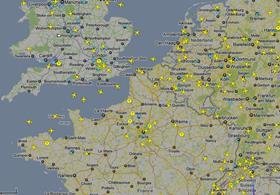
A large proportion of flights across Europe have resumed today as the volcanic ash cloud lingering across European skies begins to dissipate, marking the end of six days of extreme disruption for passengers and airfreight alike.
The Eyjafjallajökull volcano in Iceland began erupting with severity on 14 April, throwing volcanic matter several kilometres into the atmosphere – resultingin an ash cloud that travelled southwards over Europe.
As a result of the potential damage that such a cloud can cause to aircraft, the use of airspace across a number of European nations was either restricted or removed late last week, meaning the cancellation of some 95,000 flights across the continent.
However, a change in the intensity of the volcano and a series of successful tests showing that aircraft had increased tolerance levels in low ash density areas has led to an easing of restrictions, with air traffic agency Eurocontrol reporting that around 75 per cent of European flights would in operation today (Wednesday 21 April).
The news comes as welcome relief for numerous companies involved in the European fresh produce industry, with many affected by an inability to transport perishable cargo via airfreight.
Frankfurt-based fresh produce wholesaler Peter Grundhoefer, for example, told Reuters this week that stocks of certain products were diminishing as supplies ran low.
'This affects all of us in the fruit business,' he explained. 'We will lack beans and chilli peppers from Egypt and fresh herbs from Israel...and exotic fruits like mangoes, kumquats and physalis once stocks have been used up in the next one or two days.'
In the UK, which imports around 15,000 tonnes of fresh produce every day (2 per cent via airfreight), certain items such as green beans and exotic fruits had become 'less visible' in supermarkets, according to Freight Transport Association spokesperson Jo Tanner, while Grant Liddell of the Uniserve Group told the Telegraph that problems would continue with the expected backlog of airfreight flights.
Mr Liddell added that while some companies had converted airfreight deliveries to seafreight, others were limited in what they could do. 'You can't ship certain exotic fruits, flowers or fish by sea – that's why they're called perishables,' he noted.
Even so, there was positive news for UK-based fresh produce importer Blue Skies yesterday, which announced that it had restarted production at its factories in countries such as Ghana, South Africa, Egypt and Brazil as the first airlines operating in and out of mainland Europe began to resume operations.
'We are gradually beginning to resume production and we are confident that we will be able to fly to some European destinations within the next 24 hours,' said group chairman Anthony Pile.
The impact on the airlines themselves has also been substantial, according to the International Air Transport Association (IATA), which estimated that the volcano crisis had cost companies over US$1.7bn (€1.26bn) in lost revenue through to Tuesday 20 April – six days after the eruption.
According to the IATA, some of the problems could have been avoided had the European Commission used different measures for handling airspace closures, with the EC announcing that existing standards had been revised on Monday 19 April.
'Airspace was being closed based on theoretical models not on facts. Test flights by our members showed that the models were wrong,' said IATA general director Giovanni Bisignani. 'Our top priority is safety. Without compromising on safety, Europe needed to find a way to make decisions based on facts and risk assessment, not on theories.'



